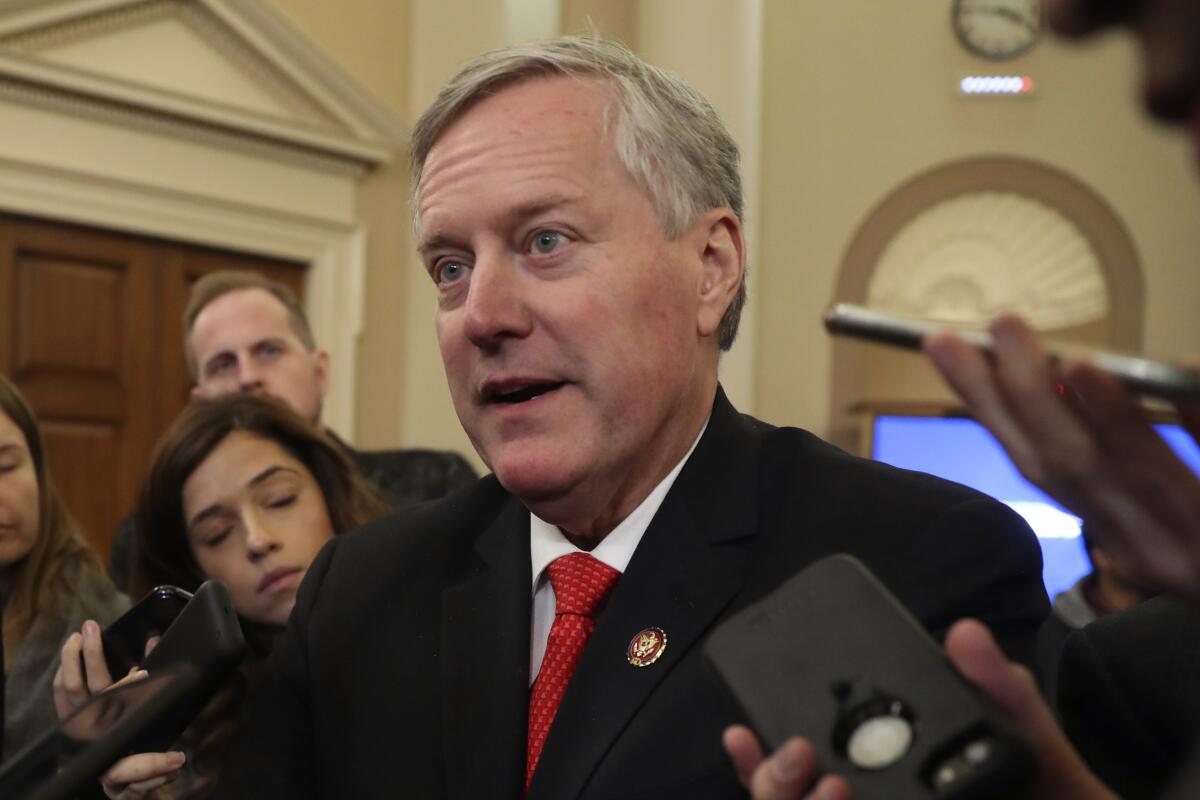Trump’s aide Mark Meadows faces a huge legal setback. It should worry both of them

- Share via
Friday’s ruling denying former White House Chief of Staff Mark Meadows’ effort to move his case to federal court has significant implications for him and his co-defendants in the Georgia racketeering prosecution, not least Donald Trump.
Meadows’ high-stakes gamble in taking the stand to support his motion didn’t pan out. That likely dooms his chances of claiming immunity from state prosecution under the U.S. Constitution’s Supremacy Clause, which I’ve argued was what drove him to take the risk of testifying.
Now Meadows returns to state court to face serious charges. And if he ever contemplated cooperating with either Fulton County Dist. Atty. Fani Willis or federal special counsel Jack Smith, those prospects also have taken a nose dive.
Litman: Trump’s Chief of Staff Mark Meadows seems to think he can avoid prosecution. Here’s how
His bid to remove the Georgia case to federal court appears to be part of a strategy to secure immunity and make Fulton County Dist. Atty. Fani Willis’ case go away.
Meadows probably burned his bridges with Willis when he gave what the prosecution saw as false testimony by asserting that he had played no role in coordinating false electors in Georgia, words he had to eat on cross-examination. Prosecutors are loath to make deals with perjurers, and Willis likely doesn’t need Meadows’ testimony to make her case anyway.
And even if the window remains open for Meadows to cooperate with the federal prosecution, it would be of little use to him without protection from the Fulton County charges.
Meadows immediately appealed U.S. District Judge Steve Jones’ ruling, but given the judge’s analysis, his prospects in the 11th Circuit Court of Appeals are iffy at best. While the appeal might delay his reckoning, he has steeply diminished odds of avoiding conviction in Fulton County and a substantial term in a Georgia prison.
Litman: Some of Trump’s co-defendants could go to trial this fall. Will he have to join them?
Kenneth Chesebro and Sidney Powell could go to trial in November. Fulton County Dist. Atty. Fani Willis has argued that the entire case, including the ex-president, should go with them.
The core of Jones’ methodical, fact-driven ruling is that Meadows undertook the conduct at the heart of the state’s charges on behalf of the Trump reelection campaign with the ultimate goal of affecting Georgia’s election. That demolishes Meadows’ argument that his conduct fell under his duties as a federal official and therefore must be tried in federal court. The executive branch’s powers obviously do not extend to any sort of oversight of state elections.
Jones’ decision has other important implications. Chief among them, it dramatically reduces the odds of success for the other defendants seeking to transfer the case to federal court, which offers a more favorable jury pool and other advantages. Meadows’ argument that he was acting within the normal duties of a chief of staff was the best of the bunch seeking removal.
The three charged phony electors’ argument for removal is just silly. They say they were federal officials by virtue of being chosen as electors. Willis’ team pithily punctured that argument by pointing out that they were pretend electors.
Former Assistant Atty. Gen. Jeffrey Clark, who is charged with falsely asserting to Georgia officials that the election results were tainted by fraud, faces the same problem as Meadows without the benefit of having been a top Trump aide: Oversight of state elections was not part of his job description as a midlevel Justice Department bureaucrat. Even less did his official duties encompass using lies to try to keep Georgia’s electoral votes from going to Joe Biden.
That brings us to the former president himself. Under the analysis in Jones’ opinion, Trump’s argument for removal to federal court is dead on arrival. The conduct he was charged for is light-years away from any reasonable formulation of a president’s duties. Indeed, other courts have already held that Trump’s actions fell outside the outer perimeter of those duties.
While the removal claims are for these reasons unlikely to succeed, they will still play a role in the formidable task of carving up the crowd of 19 defendants for trial purposes.
Superior Court Judge Scott McAfee, who is presiding over the Fulton County trials, recently noted the troubling prospect that the 11th Circuit Court could reverse a removal determination after a defendant’s state trial is already underway.
The only way to guard against that is to avoid scheduling the state trials of defendants seeking removal until after their appeals have run their course.
Depending on how long that takes, it might require three separate trials: one for the defendants who invoked their speedy-trial rights, one for the group seeking removal to federal court and one for the remainder. And the number of trials could grow larger still if, for example, another defendant makes a later motion for a speedy trial. The prospect of three or more months-long trials of different defendant groups, each repeating the same evidence, is daunting and beyond ponderous.
Meadows, who brought the removal motion the day after he was charged, appealed Jones’ ruling within hours. Why such haste? The best explanation, it seems to me, is that he’s doing everything he can to avoid being tried with Trump, who can be expected to draw out his removal motion as long as he can. A trial with Trump would be the worst possible look for Meadows, who would come off as a cynical enabler of the former president’s treachery.
But Meadows’ hopes of separating himself from his former boss look dim. Having been forced into two or three separate trials, McAfee will probably be reluctant to subdivide them even further.
Just weeks ago, Meadows seemed to have been the most clever and successful of all the former president’s men and women. He had dodged a federal contempt prosecution for his refusal to cooperate with the House Jan. 6 committee and cooperated enough with the special counsel to keep himself out of Trump’s federal election interference indictment, all while keeping his head down and his profile low. That’s all done now, as very likely are his hopes of escaping incarceration.
Harry Litman is the host of the “Talking Feds” podcast. @harrylitman
More to Read
A cure for the common opinion
Get thought-provoking perspectives with our weekly newsletter.
You may occasionally receive promotional content from the Los Angeles Times.












